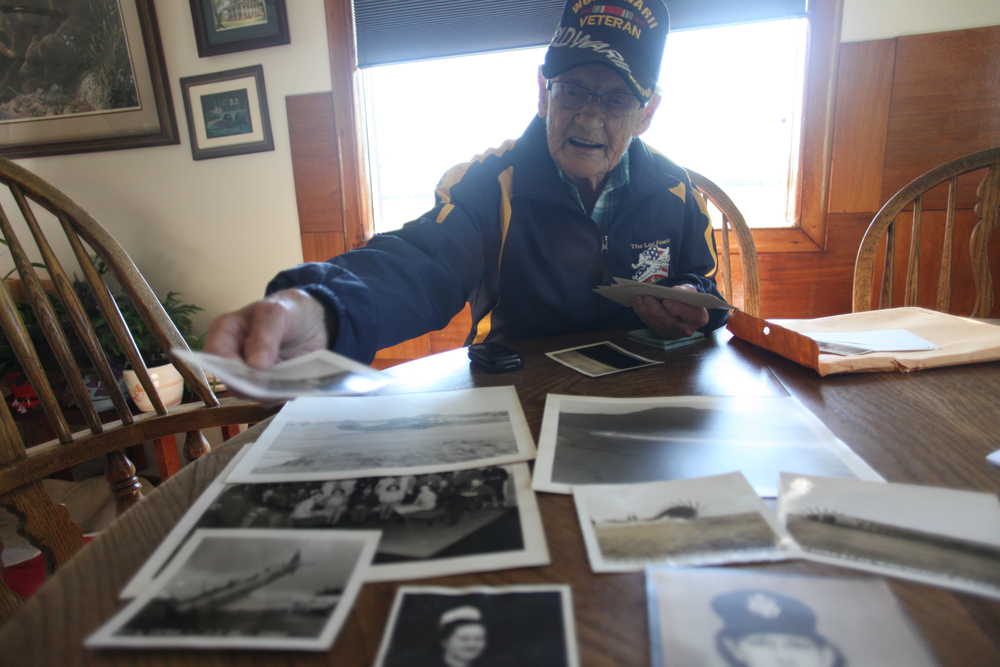Bystanders lined the Kenai Municipal Airport sidewalks with reeling flags and raucous fanfare last month to welcome home three local veterans.
They flew along with nearly two dozen of Alaska’s World War II and Korean War veterans April 26 through May 1 to Washington D.C. and toured parks, memorials and museums in a celebration of their service organized by The Last Frontier Honor Flight, the Alaska Hub of the national Honor Flight Network. For some onboard, such as Sterling resident and Korean War veteran Jack Dean, whose second tour ended without much recognition in Seattle, the trip provided due pomp.
“Going on this honor flight, we were honored everywhere we went. I had to wait 60 years for this belated honoring. That is how I looked at that honor flight,” Dean said with a laugh. “Every time we landed people were clapping and there was even bagpipers.”
On the honor trip, Dean wore a Purple Heart and the Silver Star, which he earned as Rifle Squad leader during the battle for Hill 851 as part of the 17th Regiments battle for Chup’a-ri, North Korea, in early September 1951. His was one of many experiences that evoke a sharp whistle of reverence from Chuck Cook, board member of the Alaska Honor Flight Network.
Cook has been on each of the six honor flights that have departed from Alaska. The trips are scheduled twice every year and are paid for by the Honor Flight Network. Roughly 28 veterans have flown from the Kenai Peninsula, and about 19 of the 28 have come from the central Kenai Peninsula, he said.
Priority is currently given to World War II and Korean War veterans who may not have many years left, Cook said.
“They don’t think they deserve it, so I have to tell them ‘You are not just going for you, you are going for your family and your buddies that didn’t make it,’” Cook said. “So, there’s a lot of reasons why they need to go.”
Recollections from Kenai resident Morris Breed, a foot soldier in the Korean War from 1949 to 1951, also humbled Cook. Breed was one of only a handful that made it out when his company of 900 men walked into an ambush by 20,000 North Korean soldiers.
“I have had bodies piled around me,” Breed said. “They were rotting, and shot full of holes. Maggots were coming out of them.”
Breed grew up on a farm in northern Minnesota.
“I was used to dead animals,” he said. “When it’s humans it was something else and you just live with it. If you don’t your mind snaps and they haul you away somewhere.”
Humor, Breed said, was one way he and many of his fellow soldiers coped with their experiences.
Breed said he enjoyed “just being with a group of men,” on the honor trip.
“We had a lot of fun, we teased each other, we had a lot of humor,” he said. “We had a serious side, too.”
Kathleen “Kitty” Mize, who served as nurse in Alaska for three years during World War II, was one of two women on the honor flight.
She was first stationed at Fort Richardson in 1943, then the former Hoff General hospital and Camp Beal in Calif in 1944. Her last nine months she spent on Attu, the westernmost island in the Aleutian chain, until she was discharged in Dec. 1945.
“Of course, I was young and foolish,” Mize said, but she had the support of her parents, who were living in Anchorage and Washington at the time. “I made friends in a hurry.”
She essentially arrived at Fort Richardson alone, and many of her peers had already been through training.
“The chief nurse, all she said was ‘There isn’t much I can tell you. There is a foxhole in the back of the barracks and if there’s an air raid just jump in the foxhole out back there,’” Mize said with a laugh.
On Attu, Mize assisted in surgeries. In her spare time she went to the bowling alley and the movie theater. A thick layer of snow coated the island for most of her stay. The hospital, built on the large U.S. Air Force base on Attu, mostly oversaw care of air accidents and frostbite victims and those wounded in typical base accidents, she said.
A struggle for control of the island took place between the U.S. and Japan. Prior to the conflict hundreds of Aleuts were forcefully evacuated from the area and some were put in prison camps during the war.
Now, Attu is uninhabited and caribou have taken over, Mize said. The skeleton of the former base still stands, she said.
After the war ended Mize, then Kathleen Foley, reconnected with Wayne Mize, whom she met at Fort Richardson. At the time of their acquaintance, she did not expect the pair would one day marry.
“It was a good experience and I am glad I went,” Mize said. “It was three years (of service), but I met my husband and we had a good life and that’s all you can hope.”
Mize will turn 96 next month. The honor flight was her first visit to the memorials, and said she wishes all veterans are given the same opportunity. She now lives in Yuma, Arizona for most of the year.
“It was a wonderful flight, I enjoyed the trip tremendously,” Mize said. “… I had no idea the grounds were so pretty.”
Gov. Bill Walker welcomed the group home at a large reception in Anchorage. Dean said he has never shaken so many hands as he did during the five-day honor trip.
Reach Kelly Sullivan at kelly.sullivan@peninsulaclarion.com.

